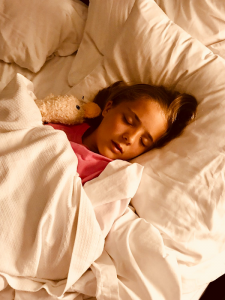
Have you noticed that your child is a mouth-breather, even without a cold or stuffy nose? Although this may not seem to be cause for concern, chronic open-mouth posture or mouth- breathing can be a sign of sleep-disordered breathing, tethered oral tissues, oromyofunctional imbalances, and other conditions that can significantly impact your child’s oral health.
Sleep Disordered Breathing
Sleep disorder breathing includes a spectrum of disorders including snoring, loud breathing, open-mouth breathing and sleep apnea. These conditions are often overlooked and left untreated. However, in many cases, they are signs of changes in your child’s health. Continuously breathing through the mouth instead of the nose can impact your child’s growth and development and their oral health and is a common cause of dental cavities within children. We encourage parents to check for signs of mouth breathing and snoring so that we can begin diagnosing the root causes and sending your child to the appropriate specialists promptly.
The importance of treatment
The jaw and tongue are used primarily for eating, speaking, and swallowing. When incorporated into the breathing process repeatedly, posture begins to be altered. This can be important as a majority of children’s craniofacial growth occurs between birth and the age of 12. Chronic mouth breathing can pull the jaw and tongue into lower positions leading to facial malformation, malocclusions, and compromised airways.
Causes
Open-mouth breathing is often an indication of a problem within the nasal passageway, the posterior pharynx, or within the oral cavity (or often a combo!). Children may not be able to recognize this as a problem as they do not understand the risks it can pose to their growth and development and often do not even realize they are doing it. Common causes of open-mouth breathing can include parafunctional habits, allergies, chronic nasal congestion, inflamed sinus tissue, a deviated septum, tongue-tie, jaw relationship and shape issues, and promotor dysfunctions. All these conditions can make it difficult to breathe through the nose, resulting in open-mouth breathing.
Symptoms
Though open-mouth breathing may seem harmless, as a long-term habit it can lead to health issues such as:
- Bruxism or teething grinding
- Crowded teeth
- Daytime drowsiness
- Dry mouth
- Irregular bite
- Jaw pain
- Morning headaches
- Poor facial development such as long face syndrome
- Poor memory or ability to focus, sometimes mimicking ADHD
- Restless sleep
- Sleep deprivation
Did you know that open-mouth breathing can lead to an increased risk of developing gingivitis and tooth decay? Chronic mouth breathing reduces the amount of saliva and disrupts the oral microbiome within the mouth, which is important to neutralizing dangerous acids and washing away harmful bacteria. Without it, the risk of tooth decay and gum inflammation significantly increases.
Treatment
As stated above, the most important thing you can do as a parent or guardian is to note the signs and symptoms and bring them to your pediatric dentist or pediatrician’s attention. By paying close attention and seeking a proper diagnosis and treatment early, we can often treat the issue before these symptoms progress resulting in long-term issues.
Treatment will vary depending on the underlying cause of your child’s mouth breathing. We will make sure to work with your child’s healthcare team to determine the best treatment for your child. In cases of allergies or nasal and airway obstructions, your child’s primary care doctor or an ENT will be the best at determining the right treatment. However, dental treatment can include palatal expanders and other functional dental appliances to help keep your child’s development on track and encourage him or her to breathe through their nose. Regular dental cleanings and maintaining proper oral hygiene can help to reduce plaque buildup and prevent gingivitis from developing as a result of open-mouth breathing. Be sure to see your dentist regularly as these issues can arise in later childhood and teen years, too! We all want your children to thrive and periodically monitoring their growth and development is key!
With Love + Health,
Doctor Staci and the NoPo Kids Team
